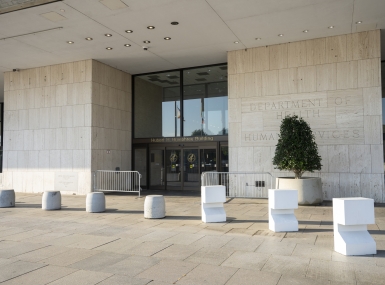Author

Blaire Bryant

Naomi Freel
Upcoming Events
Related News

Key Takeaways
Update
On November 29, the Health Resources and Services Administration (HRSA) released their final Policy Information Notice (PIN) with policy guidance for health centers who support transitions in care for justice-involved individuals reentering their communities. Under this guidance:
- Health centers must provide approved services directly under their control to help individuals transitioning from incarceration back into the community.
- Services are limited to those listed in the official guidance.
- Health centers must document that the correctional facility remains responsible for all medical care for individuals in custody, including emergency care and any issues resulting from health center services.
- Health centers are not allowed to provide services to individuals under federal custody.
An important victory for counties: NACo submitted comments strongly urging HRSA to remove the exclusion of pre-trial detainees from the guidance to ensure that all incarcerated individuals can benefit from transitional health services provided by a local community health center. In response, HRSA revised its final policy to allow health centers to provide services to pretrial detainees without an expected or scheduled release date for up to 90 days, while maintaining that carceral authorities remain responsible for detainees' medical care.
Read the Final PIN Read the Summary of Comments and Responses
On April 10, the Health Resources and Services Administration (HRSA) published a draft Policy Information Notice (PIN), which proposed critical guidance to improve health outcomes for justice-involved individuals reentering their communities. By leveraging Federally Qualified Health Centers (FQHCs) and Community Health Centers (CHCs), the policy aims to provide essential health services to incarcerated individuals during the 90 days prior to their release. This initiative seeks to enhance care coordination, reduce recidivism and alleviate the financial burden on county health systems.
NACo’s comments
The draft PIN currently excludes individuals in pre-trial detention. More than 80 percent of those in jails are pre-trial detainees, presumed innocent. In larger jurisdictions, the percentage is higher, such as 87 percent in New York City’s Rikers Island and 97percent in San Francisco’s jails.
NACo strongly urges HRSA to remove the exclusion of pre-trial detainees from the guidance to ensure that all incarcerated individuals can benefit from transitional health services provided by a local community health center. Including all incarcerated individuals will not only ensure they receive necessary transitional health services, but will also improve overall reentry outcomes and reduce recidivism. By supporting this change, county officials can help enhance the impact of HRSA’s guidance, ensuring better health outcomes for justice-involved individuals and aligning with comprehensive CMS policies. This advocacy is crucial for the well-being of our communities and the efficient use of county resources.
Impact on counties
- Significant Impact on Local Jails: County governments operate 2,875 of the nation's 3,160 local jails. In 2022, these jails admitted approximately 7 million individuals with an average stay of 32 days. Mental health and substance use issues are prevalent, with serious mental illnesses three to four times more common among jail inmates than the general population.
- Health and Public Safety of Residents: Forty percent of the jail population has a serious chronic health condition, 44 percent have a major mental health illness and 63 percent suffer from a substance use disorder. Over 95 percent of incarcerated individuals eventually return to their communities, often facing delays in health insurance reenrollment and access to critical health services.
Counties invest $176 billion annually in community health systems, justice and public safety services. This includes covering the entire cost of medical care for arrested and detained individuals. Federally Qualified Health Centers (FQHCs) and Community Health Centers (CHCs) are essential in delivering healthcare to reentering individuals. Counties support using these centers to provide health services for 90 days before an individual’s release, improving care coordination and continuity.
Advocacy
HRSA offers funds to aid care transitions for justice-involved individuals
On April 10, the U.S. Department of Health and Human Services’ Health Resources and Services Administration (HRSA) announced the availability of $51 million in funding opportunities open to HRSA-funded health centers.

Related News

U.S. Department of Health and Human Services announces major restructuring
On March 27, the U.S. Department of Health and Human Services (HHS) announced a sweeping reorganization that will consolidate agencies, shift key programs under a new framework and eliminate thousands of positions. This change brings HHS in line with President Trump's Executive Order, “Implementing the President’s ‘Department of Government Efficiency’ Workforce Optimization Initiative.”

U.S. Department of Health and Human Services moves to reduce public comment in rulemaking
On February 28, the U.S. Department of Health and Human Services (HHS) announced a policy change limiting public comment opportunities to only those required by law. Published in the Federal Register on March 3, the decision rescinds the “Richardson Waiver,” a 1971 directive from then-HHS Secretary Elliot Richardson that encouraged broader public input on regulations related to public benefits, grants and healthcare policies.

U.S. Department of Health and Human Services renews Public Health Emergency Declaration to address national opioid crisis
On March 18, the U.S. Department of Health and Human Services (HHS), under the direction of Secretary Robert F. Kennedy, Jr. renewed the public health emergency (PHE) declaration to address the ongoing opioid crisis, extending critical federal support for coordination, treatment expansion and research efforts. While overdose deaths have declined by 25.5 percent over the past year, synthetic opioids like fentanyl continue to drive fatalities, with approximately 150 Americans dying daily from overdoses.